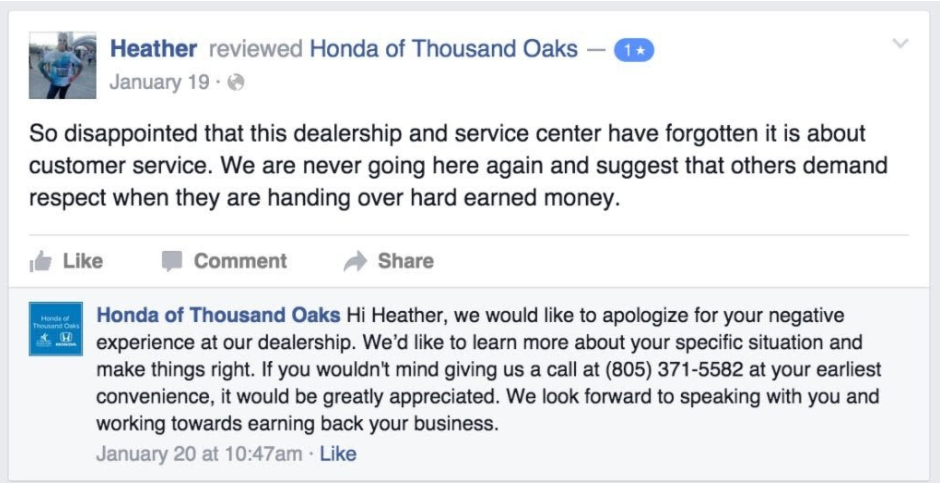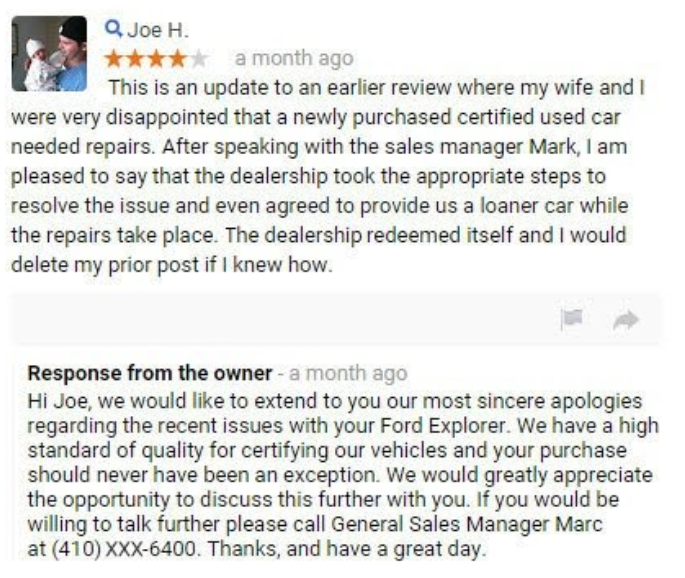O nline reviews play a vital role in the growth of any business. Lots of studies and surveys have shown the impact of customer reviews on businesses. Whether it is finding a hotel to stay in while on holiday, where to shop for household items, or which network provider to use, reviews hold power.
Here are some stats to prove the power of online reviews:
- 93% of local consumers use reviews to determine if a local business is good or bad. (BrightLocal)
- 72% of customers don't take action until they have read reviews. (Testimonial Engine)
- 92% of B2B buyers are more likely to purchase after reading a trusted review. (G2 and Heinz marketing)
- Nearly 95% of shoppers read online reviews before making a purchase. (Spiegel Research Center)
These stats show the impact of online reviews on sales and revenue.
While positive online reviews help grow your business, negative reviews can cause you serious problems. When customers are researching your brand and they see mostly negative reviews, the likelihood of them doing business with you is slim to none.
It is important that you handle negative reviews swiftly and efficiently. In this article, you would see 8 effective tips for dealing with negative reviews online.
Let's get started.
1. Respond to reviews quickly
It is important that you respond to online reviews especially negative ones quickly.
If a customer calls a plumbing company to request for their service, it is in the best interest of the business to get back to the customer as soon as possible. Any delay in response and the customer would look for another plumbing service. From this, we can deduce that making customers wait can be bad for your business.
Why wouldn't this be the case post transaction as well?
Customers do not like it when businesses take their time before responding to reviews. When a business does not respond to negative reviews, the issue only becomes worse in the customer's head. While happy customers can be enthusiastic ambassadors for your business, unhappy customers can spoil your business reputation - they tell their family and friends of their negative experience with your company. Not only did you lose a customer, but you have also lost a ton of prospective customers.
Consider this, one negative review can turn away 22% of customers, while three is enough to drive away 60% of your customers. With all these at stake, it is important that you reach out to customers and respond to their reviews quickly.
2. Take communications offline
The internet can be the wild wild west. All communications on the internet, especially on social media, can be seen by anyone. When dealing with negative reviews online, other readers can join in. This can escalate the entire issue and make it worse. Your goal should be to limit the number of engagements negative reviews receive.
The best practice is to take the communications offline as soon as possible and talk to the customer one on one. This would help you de-escalate the issue quickly.
TIP: When moving communications offline, it is important that you are the one reaching out to the customer and not the other way around. Get their contact information and find out the best time and way to reach out to them. It is also important that you communicate with them thoughtfully and honestly.
3. Give each customer review a response
Whether positive or negative, it is vital that you give each customer review a response. 41% of customers say that brands replying to their reviews show that the business cares about them. Another survey shows that customers spend up to 49% more at companies that respond to their reviews.
Remember that online reviews are on public sites, so you are not just replying to the one reviewer but everyone who reads the review, even future customers.
The fact is that ignoring a negative review won't make it go away. It would only make it worse. Responding to the customer's review is your chance to make it right. Replying also shows your potential customers that you are not neglectful, and have taken appropriate steps to ensure that the problem doesn't happen to another customer.
Here is an example of a dealership handling a very negative customer review.

After the dealership responded to the customer complaints, here is the updated customer review below.

This shows that you should never ignore a negative review - as responding to each customer review presents the opportunity for more positive feedback after the customer issues are resolved. Positive feedback helps build a strong online reputation which is the backbone of any business’s digital presence and is also a great value-add to other marketing channels.
4. Follow up with negative reviewers
Your goal as a business owner is to ensure that customers have a positive experience after dealing with your business. One way to do this is by following up with negative reviewers and making sure that their issues are resolved.
If you have resolved the customer complaint, ask them to remove their negative review. Most customers would be happy to take down a bad review and even replace it with a positive one after they have been dealt with fairly.
Following up also shows the customer that you value them. It can also help you build your relationship with them.
5. Encourage your customers to leave reviews
It doesn't matter if you run a B2B, B2C, e-commerce, or local business, reviews are very important. For one, reviews help with SEO. For local businesses, online reviews can help boost local search visibility. For every other kind of business, reviews on popular sites can help you rank for more branded search terms.
Also, one of the best ways to deal with a negative review is by countering it with a ton of positive reviews. As prospects rely on reviews from other customers before making purchasing decisions, having positive reviews would help build confidence and trust in your products or services.
Here are some ways you can encourage customers to write a review:
Ask for reviews
63% of customers are more likely to make a purchase from a site which has user reviews. If you're not yet convinced of the importance of reviews, you can check more stats here. You can find even more interesting stats here The easiest way to encourage customers to write reviews is by just asking. Many of your customers would be happy to write about their positive experiences with your product or service.
Here are some ways you can ask for reviews:
- Encourage staff to ask customers for feedback after the end of any transaction
- Put up signs in your office building encouraging customers to leave reviews in websites like Yelp
- You can add a link to a review site in your email signature
- Reach out to customers on social media and ask them to leave a review
Make writing the review as simple as possible
It is important that you make it very easy for the customer to give their review. Provide customers with only a few review options to choose from. The fewer the sites, the more likely they would take time to leave a review.
A good recommendation is to send the customer a direct link to your Google My Business review section.
Explain why reviews are important
You can increase the number of reviews you have by educating your customers on the importance of reviews. Customers that want to support your business would show their support in the form of positive reviews. You can also push the idea that leaving a positive review also helps prospective customers.
Send review requests at the right time
When sending out emails for review requests, ensure you get the timing right as this might vary from business to business. Also, send in your review requests when your service is still fresh in the mind of the customer.
6. Request that fake reviews be removed
Not all reviews would be authentic. Some of them would be fake and misleading.
A former employee or even your competition can conjure up negative reviews to soil the reputation of your business. It is important that you deal with fake reviews promptly.
Depending on the site where the review was left, you can request that the review is assessed and subsequently removed.
Here are a few major review sites and how to deal with this situation:
Facebook:
Facebook would remove any review that doesn't comply with their community guidelines. These are the steps you would take:
- Find the review in question.
- Click on the V-shaped icon in the top right corner of the review.
- Click on "Report Post"
- and follow the instructions.
Yelp:
Yelp would remove a review if the reviewer has a clear conflict of interest or include offensive information. Without any evidence, the review would probably stay up.
- Log in to your business's Yelp account.
- Find the review in question.
- Click on the flag icon in the bottom right of the review.
- Select the reason you're reporting the post, and write out your explanation
Google:
Google would also remove a review if it is written by someone with a conflict of interest or an impersonator.
- Search for your business on Google maps
- Click on your business overall star rating and it would take you to a list of reviews
- Hover over the review you want to remove with your mouse and click on the flag icon that appears
- Then follow the prompts.
One unhappy customer or jealous competitor doesn't have the power to hurt your business. If you cannot get the false review removed, you can respond to the review in a positive way.
TIP: The best way to deal with fake reviews is by attracting a ton of positive reviews.
7. Offer compensation when necessary
Not every negative review would deserve compensation. Most customers just want their voices to be heard.
But there are instances when compensation for hardship faced by the customer would be necessary. For example, if a customer suffers financial loss or personal damage, compensation would be required. This compensation can be in the form of a money-back guarantee. Compensation can put you back in the good books of the customer and help mend the strained relationship.
8. Monitor your online mentions
Monitoring your online mentions is one of the most effective ways to keep up with online reviews. In order to respond to reviews, you need to know what your customers are saying and where they are saying it.
You can use a tool like BrandMentions to find all the relevant mentions of your brand online. With this tool, you would know who talks about you and what they are saying. They also offer a useful feature called comprehensive sentiment analysis that helps you to find out the tone of the conversations you are mentioned in.
 This article is written by Marvellous Aham-adi, a freelance writer and Head of Content at TheZeroed. Where he writes on blogging tips and actionable marketing strategies you can use in growing a brand. He has been featured in top blogs like Social Media Examiner, GetResponse, Mention, and Wordstream.
This article is written by Marvellous Aham-adi, a freelance writer and Head of Content at TheZeroed. Where he writes on blogging tips and actionable marketing strategies you can use in growing a brand. He has been featured in top blogs like Social Media Examiner, GetResponse, Mention, and Wordstream.

